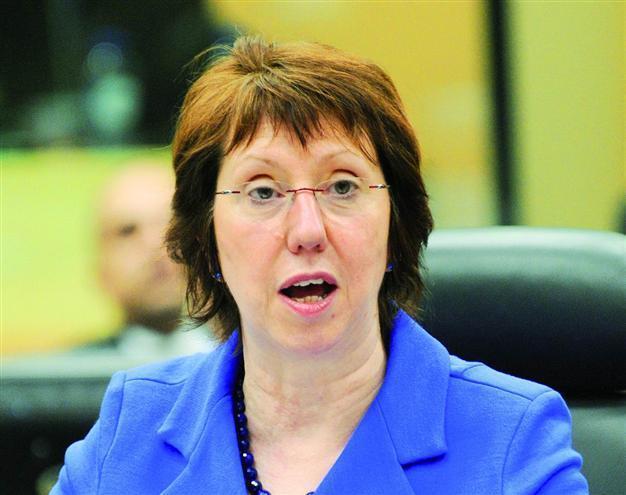Ankara calls for flexible Iran talks
ISTANBUL - Hürriyet Daily News

The EU’s foreign chief Ashton arrives in Turkey for nuclear talks with Iran. AFP photo
Officials from
Iran and the six major powers arrived in Istanbul on April 13 ahead of today’s bid to restart stalled diplomacy following months of soaring tension. The meeting is widely seen as a chance for the powers - the United States, France, Russia, China, Britain and Germany - and Iran to halt a downward diplomatic spiral and start to seek ways out of years of deadlock.
Turkey has urged for “political flexibility” ahead of the nuclear negotiations between Iran and the six world powers today. Turkish Foreign Minister Ahmet Davutoğlu met with Catherine Ashton, EU High Representative for Foreign Affairs, a day before Istanbul hosts nuclear negotiations between the P5+1 countries (the five permanent members of the UN Security Council and Germany) and Iran. Davutoğlu told Ashton that “this meeting was a good opportunity for all parties, and political flexibility would be useful in the
talks,” an official from the Foreign Ministry told the Hürriyet Daily News.
Turkey supports the continuation of the negotiation process and is ready to contribute, the minister told Ashton, according to the official. Davutoğlu also briefed the EU representative about the “border violation” when Syria opened fire across the Turkish border into a refugee camp on April 9, killing two people. He was expected to convey the same messages to Iran’s Chief Nuclear Negotiator Saeed Jalili too. Today’s meeting will be the first time the two sides have held such talks in over 14 months. At the last meeting, also held in Istanbul, the parties could not even agree on an agenda.
Jalili had arrived in Istanbul and was expected to meet Minister Davutoğlu when the Daily News went to press yesterday. Iranian news agencies said his deputy Ali Baqeri had held talks with Russian and Chinese officials yesterday.
Jalili said he would bring “new initiatives” to the discussions and that Iran was ready to hold “successful and progressive talks on cooperation.” The formal talks with the six powers and their chief representative, Catherine Ashton, will get underway today, but Ashton and Jalili were expected to meet over dinner on the night of April 13.
Western countries accuse Iran of seeking to develop nuclear weapons capability, and Israel has hinted at military strikes to prevent its arch foe from obtaining such arms. Diplomats and analysts have played down expectations for any major breakthrough in the first round of discussions, but say the meeting may pave the ground for further negotiations aimed at resolving the long-running dispute.
Positive signalsHovewer, both sides signaled in the run-up to Saturday’s discussions their intent to give diplomacy a real chance. “It’s excellent that these talks are finally going ahead, more than a year since we last met,” Ashton’s spokesman Michael Mann said. “We hope that this first round will produce a conducive environment for concrete results through a sustained process.” Iranian Foreign Minister Ali Akbar Salehi, in a rare opinion piece in a U.S. newspaper, said his country hoped that all sides would commit to comprehensive dialogue and that negotiators make “genuine efforts to reestablish confidence and trust”. “ Salehi said Iran had many times “marked our opposition to weapons of mass destruction.”
Major powers want the Iranians to outline steps to show that they have abandoned any pursuit of nuclear arms, U.S. Secretary of State Hillary Clinton said on April 12. “We are receiving signals that they are bringing ideas to the table,” Clinton told reporters. “We want them to demonstrate, clearly, in the actions they propose that they have truly abandoned any nuclear weapons ambition.” “We are looking for concrete results. And of course, in a negotiation, we understand that the Iranians will be asking for assurances or actions from us and we will certainly take those under consideration,” Clinton said, without providing details.
Davutoğlu to meet Hashimi
Meanwhile, Turkish Foreign Minister Ahmet Davutoğlu was expected to meet Iraqi Vice President Tareq al-Hashimi, the top Sunni Muslim politician, who authorities in Baghdad are seeking to jail on terrorism charges, when the Daily News went to press yesterday.
Al-Hashemi traveled to Turkey after visits to Qatar and Saudi Arabia last week. Lending support to the Sunni politician, Turkey protested Iraqi Prime Minister Nuri al-Maliki after Iraq’s Shia-led government issued an arrest warrant for Hashimi, shortly after U.S. troops left Iraq last year.
nuke,
